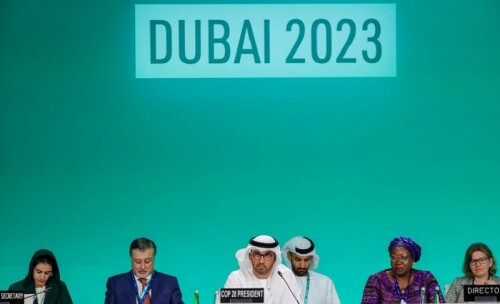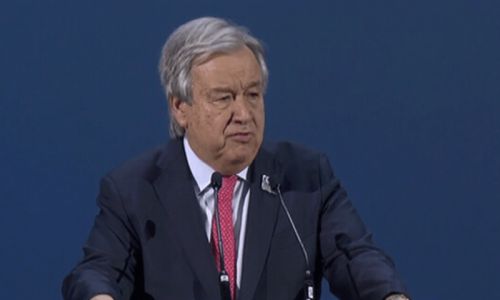• US, over 20 other nations call for increasing N-energy capacity; Washington pledges to cut methane emissions
• PM Kakar urges immediate execution of $100bn committed for climate finance
• Negotiators face tough talks on the fate of fossil fuels
DUBAI: Nearly 120 nations pledged to triple the world’s renewable energy within seven years at UN climate talks on Saturday as the United States pushed to crank up nuclear capacity and slash methane emissions.
With smoggy skies in Dubai highlighting the challenges facing the world, leaders at the COP28 conference threw their support behind voluntary pledges aimed at ramping up alternatives to fossil fuels.
A massive deployment of solar, wind, hydroelectric and other renewables is crucial to efforts to replace planet-heating coal, oil and gas and achieve net-zero carbon emissions by 2050.
But negotiators face far tougher talks on the fate of fossil fuels over the next two weeks.
“Everyone stuck to their traditional positions,” said one official.
But on clean energy, more than half of all nations signed up to a commitment to triple global renewable capacity and double energy efficiency by 2030, the conference’s Emirati president said.
However, major oil producers, including Saudi Arabia, Russia and Iran, did not join, nor is top consumer China on the list.
“I do need more, and I’m kindly requesting all parties to come on board as soon as possible please,” the event’s president, Sultan Al Jaber told delegates.
Clean power advocates welcomed the commitment, but said it must be accompanied by the phaseout of dirtier forms of energy.
“The future will be powered by solar and wind, but it won’t happen fast enough unless governments regulate fossil fuels out of the way,” said Kaisa Kosonen, the head of Greenpeace’s delegation.
Jaber also announced a pledge by oil and gas companies responsible for 40 per cent of global production, including Saudi giant Aramco and the UAE firm ADNOC he heads, to decarbonise their operations by 2050 and curb methane emissions.
But the pledges do not include the pollution when the fuels are burned by their customers, and were criticised for repackaging previous, non-binding commitments.
“This charter is proof that voluntary commitments from the oil and gas industry will never foster the level of ambition necessary to tackle the climate crisis,” said Melanie Robinson of the World Resources Institute, a non-profit research body.
Destructive methane
It comes after the US Environmental Protection Agency said it would tighten curbs on methane emissions from its oil and gas industry.
The new standards will phase in the elimination of routine flaring of natural gas produced by oil wells, and require comprehensive monitoring of methane leaks from wells and compression stations.
Methane is responsible for about one-third of the warming from greenhouse gases, second only to carbon dioxide.
“It is fugitive gas, and it just is out there doing damage,” said US climate envoy John Kerry, who met his Chinese counterpart Xie Zhenhua in Dubai to discuss how to curb the gas.
Their meeting followed an agreement with the US where China for the first time agreed to include all greenhouse gases in its next national climate pledge for 2035.
Kerry also announced that Turkmenistan, which leaks more methane per unit of oil and gas than any other country, had signed up to an existing pledge to curb these harmful emissions.
The US also joined a coalition of dozens of nations committed to phasing out coal power plants whose emissions cannot be captured.
Nuclear option
While COP28 rallied behind renewables, Washington led a call by more than 20 nations to triple nuclear energy capacity by 2050.
In a declaration, countries ranging from Britain to Ghana, Japan and several European nations said nuclear power had a “key role” in achieving carbon neutrality by mid-century.
But its use as a cleaner alternative to fossil fuels is highly controversial, with many environmental groups warning about safety risks and the disposal of nuclear waste.
Yet Kerry insisted “you can’t get to net zero 2050 without some nuclear”.
More than 50 world leaders took the stage at the event, for the second day in a row, with US Vice President Kamala Harris announcing a $3 billion contribution to a fund to help developing countries with energy transition and the effects of climate change.
It was Washington’s first pledge to it since 2014.
PM for fulfilling $100bn pledges
Caretaker Prime Minister Anwaarul Haq Kakar called for immediately executing the $100 billion commitments for climate finance to ensure implementation of decisions by developing countries and to mitigate the impact of climate change.
“Such finance should neither be at the cost of development finance nor add to the already high debt burden of developing countries,” the prime minister said in his address to the COP28.
He called upon developed countries to take the lead in raising global mitigation ambition commensurate with their economic standing and historical responsibility and then help developing countries do the same.
“We need to achieve global resilience through delivering an ambitious outcome in the form of a framework for global goal on adaptation with clear targets and indicators including regular monitoring of progress,” he said, adding that at least half of climate finance must be allocated to adaptation.
The prime minister said that expectations from COP28 were high, but not unrealistic, hoping that the present round of COP would deliver with action, and not just words.
He laid emphasis on providing adequate means of implementation, including climate finance, capacity-building and technology, to developing countries.
At COP26 at Glasgow, he said Pakistan increased its ambitions presenting the revised Nationally Determined Contributions (NDC) with a target of 60 per cent overall reduction in projected emissions by 2030.
“This year, Pakistan presented a comprehensive national adaptation plan and has also launched an innovative Living Indus Initiative that brings together our care for climate and for nature,” he said.
“We will also be presenting our first updated report during this COP.”
Published in Dawn, December 3rd, 2023















































Dear visitor, the comments section is undergoing an overhaul and will return soon.